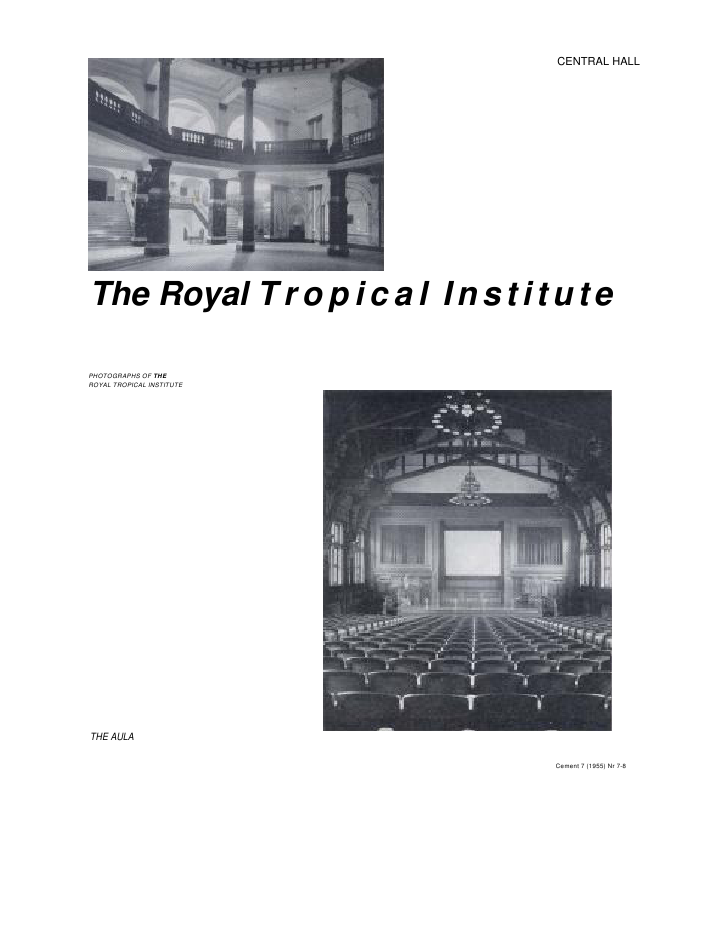
The Royal T r o p i c a l In s t itu tePHOTOGRAPHS OF THEROYAL TROPICAL INSTITUTETHE AULACement 7 (1955) Nr 7-8CENTRAL HALLexterior of theRoyal Tropical Institutein AmsterdamThe Netherlands enjoy an established reputation for their know-ledge of tropical affairs, nationally as well as internationally.One of the foremost institutions in the Netherlands, where thisknowledge is collected, preserved, studied, enlarged and madeavailable to the public, is the Royal Tropical Institute in Amster-dam.Founded in 1864 on the initiative of the Netherlands Society forthe Promotion of Industry it can look back on 90 years of activity.Originally dealing only with the Dutch overseas territories itsfield of activity was enlarged, shortly after World War II, to coverall tropical and sub-tropical areas.It took possession of its present buildings in 1926, which wereofficially opened by Queen Wilhelmina on the 9th October ofthat year.The Institute is an incorporated, strictly non-political society.Its non-political nature is of great importance for its task and aim.The work is carried out under the general guidance of a Board ofDirectors and supervised by the Executive Committee, while theactual management is in the hands of the General Secretary.The information and ideas which are made available pertain tothe economical, the medical and cultural field. This is done byfour departments, three of which carry out scientific work.These four departments are:a. the Tropical Products Department, which deals with tropical/eco-nomical subjects. It has at its disposal laboratories for physio-chemical, biological and soil research and a comprehensive docu-mentation of economical and agricultural/economical subjects,which enables those interested to obtain immediately therequired literature. A selection from this documentation is givenin a fortnightly bulletin called Tropical Abstracts', which can beobtained for a moderate subscription.b. the Tropical Hygiene and Geographic Pathology Department, whosetask is:(1) to give advanced tuition to medical students and doctorswho are preparing themselves for a job in the tropics:(2) to give information and advice on the prevention of tropicaldiseases:(3) to carry out and publicise researches on tropical diseases;(4) to contribute to the Dutch share in promoting internationalpublic health.For the latter task it has the necessary laboratories, one of whichis licensed by the World Health Organisation to produce theyellow fever vaccine.c. the Cultural and Physical Anthropology Department, which dealswith the study of the social relations in the tropics also in con-nection with the economical aspects. This department contributeslargely to the spreading of knowledge and understanding of thesocio-cultural and anthropological facts and characteristics of thepeoples of the tropical countries, such as social structures,problems of land cultivation, Islam, arts and crafts, etc. Membersof the staff take part in university instruction.d. the General Affairs Department, which consists of:1. the Central Library and Public Reading Room, which has acollection of 42 000 books, I 000 series of current magazinesand I 500 series of geographical maps and a documentationof maps which appear in books and magazines, all free of chargeat the service of the public.2. the Photographic Section (and studio) with a large collectionof photographs, lantern-slides and films for study and publicitypurposes.3. the Educational Section, which maintains contact with theelementary and high schools in the Netherlands and takespart in the tuition on tropical and sub-tropical subjects,according to modern educational methods and ideas. In addi-tion it provides information to youth organisations outsideschools and to cultural organisations.4. the Courses and Translations Section, which organises coursesand lectures for public and private workers in their prepara-tion and schooling needed for the task they will have to fulfilin the tropics.Among the subjects taught are the eastern languages, publicinstitutions, the social and economical relations, etc. In additionIt undertakes translations of the main languages of the tropicalcountries, such as Indonesian, Spanish, Portuguese, etc.5. the General Information Section, which deals with publicrelations and publicity in general, thereby making use of thepress, film, radio and television.The character of the Institute as an institute for public informa-tion is clearly demonstrated by its Museum. The well arrangedexhibits, illustrations and explanations in the Tropical Museumgive visitors a clear idea of the natural and art products of thetropical countries, the customs of the peoples of these countriesand their philosophies and religions; the Museum also shows thework of the public health services and the methods used againsttropical diseases.Although its activities are in many different fields, the Institute isessentially a single body with a serving task as regards the tropicaland sub-tropical countries, a task which is carried out by all itsdepartments by their study and elucidation of the cultural,economical and medical problems concerning these countries.Cement 7 (1955) Nr 7-8

Reacties